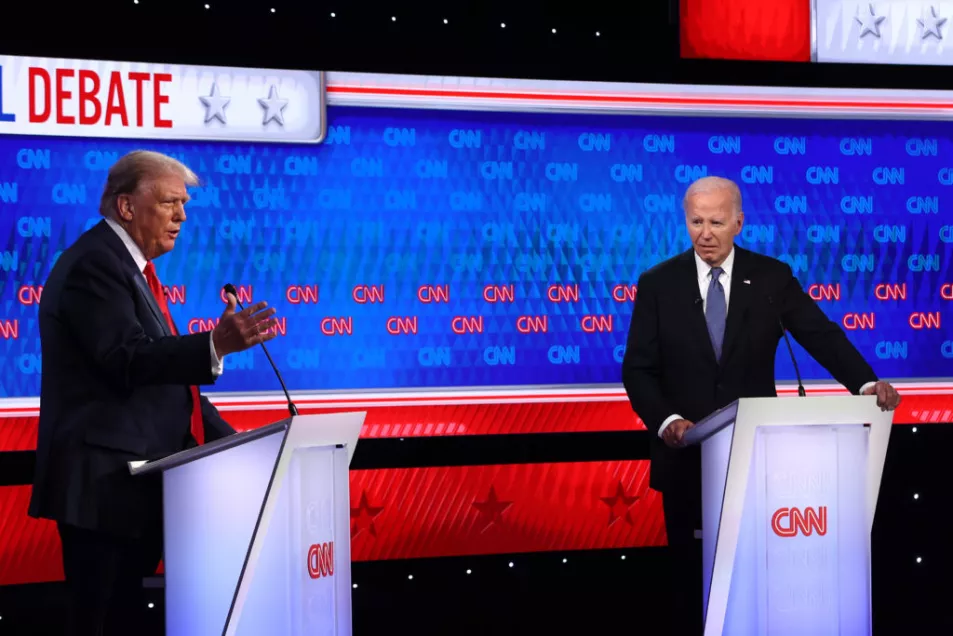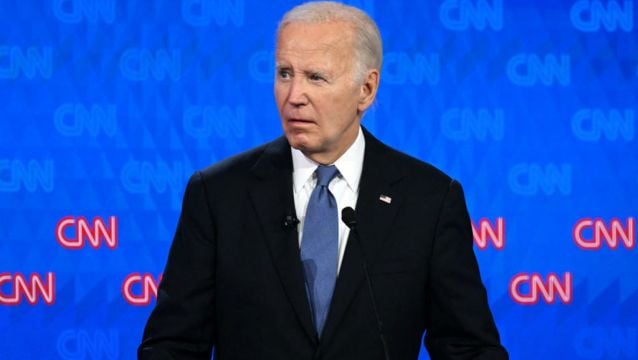US president Joe Biden will need to give a series of strong interviews and public appearances to undo the damage from last week's underwhelming debate performance against Donald Trump, according to Ireland's former ambassador to the US.
The 90-million CNN debate was watched by over 50 million Americans, and it has sent shockwaves through the Democratic Party.
Mr Biden appeared confused at times as he struggled to get his point across, and while his predecessor uttered plenty of exaggerations and falsehoods, Mr Biden didn't have the energy to counter them.
Daniel Mulhall was the Irish Ambassador to the US from September 2017 to August 2022, for the majority of Mr Trump's presidency and a large portion of Mr Biden's term.
In an interview with BreakingNews.ie, Mr Mulhall said Mr Biden's debate performance will not do him any favours with people who argue he is too old for the presidency at 81.
"If you look at the two candidates, they're only three years apart in age, but Biden just looked older and, in a way, the debate appeared to confirm the fears that people have about Biden's age, which are widely held across the United States according to opinion polls."
Mr Mulhall pointed out that replacing a candidate, especially an incumbent president, just four months out from a presidential election would be very difficult.
The decision would more than likely have to come from Mr Biden, he added.
"This is not simple, straightforward business. If it was an Irish political party, the leader could be changed anytime, but this is a different story because Biden has won the primary election, and he is the presumptive Democratic nominee. To change that would be a hell of a manoeuvre, and I don't think it would be possible to do it unless Biden decides to step aside. So far, he doesn't seem minded to step aside."

Governor of Michigan Gretchen Whitmer and governor of California Gavin Newsom are two names that have been heavily touted as potential presidential candidates.
Mr Mulhall reiterated that Kamala Harris would be the likely replacement if Mr Biden did step aside.
On the difficulty of swapping state politics for a national campaign, Mr Mulhall pointed to Florida governor Ron DeSantis' unsuccessful bid for the Republican nomination.
Even if Biden did decide to step aside, the selection of an alternative candidate would be quite challenging.
Advertisement
"Even if Biden did decide to step aside, the selection of an alternative candidate would be quite challenging. The obvious replacement would be vice president Kamala Harris, but her popularity is not high with the electorate. There would be doubts about her ability to beat Donald Trump.
"There are various other potential candidates, Democratic governors and senators, who would potentially be capable of stepping up, but they are all untested at national level.
"There are so many cases in American history of governors who looked like the real deal at state level, and when they step up to national level they are found out. The most recent example of this is governor Ron DeSantis, who is a very successful and powerful governor of Florida, but didn't succeed at all when it came to the primary process. It's a risky endeavour to choose a new candidate at this stage and to introduce the candidate to the American electorate with four months to go.
"I think the most likely outcome if president Biden were to step aside would be that Kamala Harris would end up as the candidate, but that's not guaranteed to change the outcome of the election, which at the moment is looking bad for the Democrats."
Mr Mulhall said there is plenty of time for Mr Biden and his campaign to change things ahead of the November 5th vote.
"While the polls suggest Trump is ahead, it's always in the margin of error and that can change. It only needs a couple of percentage points to change the possible outcome. I don't think anyone should regard this election as done and dusted.
"Whether it's Biden or someone else up against Trump, it's going to be a closely fought election that comes down to a relatively small number of votes in key states where the election is always decided; places like Pennsylvania, Wisconsin, Michigan, Nevada, Georgia, Arizona, that's where the decision will be made.
"We don't know yet what kinds of issues and developments might change the minds of swing voters, who haven't committed to Trump or Biden. That will depend on the evolution of the campaign over the next three and a half months.
"With all campaigns, it's about setting out your own stall and warning about the downsides of your opponent. I think so far the Democrats appear to be more so about highlighting the fears of a second Trump presidency. They're trying to highlight the more extreme positions Trump has taken since he lost the presidency."
Mr Biden has been criticised for not conducting as many interviews with TV stations and media outlets as past US presidents. Mr Mulhall said this strategy will have to change as he looks to convince the public his debate performance was a "blip".
Positive Joe Biden has to be shown to the public in the next three months.
"They have to prove it. Saying it is one thing, but you have to show it. The only way that can be done is to put him out for interview with various news channels. To demonstrate to people that he is focused and sharp, and for some reason he wasn't on his game last week, but that's not the true Joe Biden.
"Positive Joe Biden has to be shown to the public in the next three months. The question is whether they're willing to do that, and whether Biden can pull off a series of sharp, positive, fighting interviews that can turn the tables on Donald Trump.
"While he was more disciplined in this debate, Trump is Trump, and he's not likely to be disciplined every day for the next three and a half months. There's plenty of scope for him to damage his prospects by saying things people will recoil from. Likewise, there's plenty of scope for Biden, he's going to have to go out more, be in the public eye, do more interviews with TV stations, in order to demonstrate he is on top of his game and the debate was a blip.
"There are risks those interviews may not go to plan. There is a lot of risk on both sides, which is why I think the election remains a cliffhanger and is likely to be decided by relatively small margins in a number of states."
The two candidates are scheduled to meet on the debate stage again in September.
While there are reasons both campaigns may not want this, Mr Mulhall feels the most likely scenario is that debate going ahead.
"Generally, the candidate who is on top, the incumbent, often tries to avoid debates and the challenger wants them. In this case, one could imagine Trump's campaign might feel they have done the business at the debate last week, and why take the risk on a second one? The Biden campaign might think it didn't go well, so they should avoid a second debate, so it could be argued on both sides to avoid another debate.
"I rather think there will be one, because I think Donald Trump will believe he can vanquish Biden again and again. The Biden campaign may think it is important for the president to go out there and demonstrate that the last debate was a one-off, a poor performance but not reflective of the president's ability to function well in that environment."
Mr Biden's campaign has portrayed the 2024 election as a fight to protect democracy, and Mr Mulhall predicted similar messaging continuing, with warnings about what a second Trump term would mean for the US and the world.







